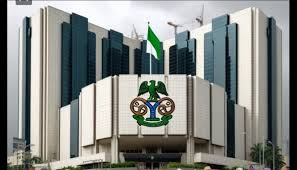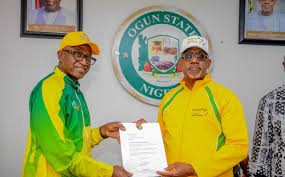Business
Metallurgical Stakeholders Want NIOMCO Pact Cancelled
The Metallurgical Stakeholders Forum has called on the Federal Government to cancel reconcession of the National Iron Ore Mining Company (NIOMCO) to Global Infrastructure Holding Ltd. (GIHL), an Indian company.
The stakeholders made the call at a news conference in Abuja on Thursday.
The stakeholders comprised the Nigerian Society of Engineers, Nigerian Metallurgical Society, African Iron and Steel Association, Host Community, and the Nigeria Labour Congress (NLC), among others.
The Tide source reports that NIOMCO, which is capable of generating billions of naira annually, is located at Itakpe, Kogi State.
The Executive Secretary-General, African Iron and Steel Association, Alhaji Sanusi Mohammed, and convener of the news conference, said that the Federal Government should cancel the concession agreement.
According to him, the company lacks competence, trust as well as the ability to manage NIOMCO.
Sanusi said that the first concession of NIOMCO and Ajaokuta Steel company to GHIL in 2004 brought unquantifiable losses to the nation with monumental economic consequences.
He said that Nigeria was short-changed by the Indian company, as it vandalised Ajaokuta Steel Company and carted away valuable assets from NIOMCO.
It would be recalled that the Ajaokuta Steel Company was concessioned to GHIL between 2004 and 2005 by then, President Olusegun Obasanjo.
However, the Indian firm did not live up to expectations as it could not manage the company.
Following the failure of GHIL to manage the company, the Federal Government under late President Umaru Yar’Adua was compelled to revoke the contract.
However, the President Muhammadu Buhari-led Federal Government reconcessioned NIOMCO to GHIL, while it took charge of the Ajaokuta Steel Company.
With the reconcessioning, GHIL is yet to commence operations.
According to the stakeholders, NIOMCO did not only witness poor performance, but also non-compliance of Post-Acquisition Plan (PAP) in terms of injection of funds, while being operated by GHIL.
“GHIL never brought Foreign Direct Investments (FDIs) into the country as confirmed by the Central Bank of Nigeria (CBN) but rather orchestrated flight and repatriation of funds from the internal funds it earned from illegal exports of Nigerian assets.
“We have written several letters to the Federal Government on the need to cancel the agreement but to no avail.
“So we decided to come together to covey the same message through the media today,’’ Sanusi said.
Citing the Delta Steel Company (DSC), he said that the Federal Government concessioned and later sold the company built with 1.5 billion dollars in 2005 to GHIL at a paltry 30 million dollars.
Sanusi said the five-man administrative panel of inquiry set up by the Federal Government in 2007 revealed the rot that was perpetrated on Delta Steel Company.
“GHIL in the period of operation in DSC stripped the company down and accumulated more than N40 billion debt it collected from Nigerian banks and used the companies as collateral’’.
Sanusi said that the reconcession of NIOMCO did not go down well with stakeholders as the Federal Government did not involve them.
“This is not acceptable to all the metallurgical stakeholders.’’
Also speaking, Prof. David Esezobor of Extractive Metallurgical and Materials Processing urged the Federal Government to pursue a clear vision as well as clear policies and roadmap to ensure development of the iron and steel sector.Esezobor said that government should remove all obstacles militating against the growth and development of the sector.
He urged the government not to privatise Ajaokuta Steel Company, till the remaining two per cent and other external infrastructure were completed.
Esezobor said that any attempt to commercialise or privatise the company would not yield the desired result of Nigerians.
He also urged the government to re-establish contact and to initiate negotiation with the original builder of Ajaokuta Steel Company, TPE, a Russian company to complete the company.
He also noted that the Governor of Kogi State, Alhaji Yahaya Bello and Alhaji Musa Bello, a Kaduna based entrepreneur were laying claim to NIOMCO, adding that they both had registered the company with the Corporate Affairs Commission (CAC).
He said that stakeholders had informed the relevant security agencies to also look into the matter.
Business
NCDMB, Partners Sweetcrude On Inaugural Nigerian Content Awards

The Nigerian Content Development and Monitoring Board (NCDMB), in partnership with a firm, Sweetcrude Ltd., has announced detailed selection criteria for the inaugural “Champions of Nigerian Content Awards”, designed to honor outstanding contributions to local content development in Nigeria’s oil and gas sector.
The Tide learnt that the event, scheduled to hold 21st May, 2025, at the NCDMB’S content tower headquarters in Yenagoa, capital of Bayelsa State, will recognize individuals and organizations that have demonstrated exceptional commitment to advancing Nigerian Content in 2024.
The Tide further gathered that the ceremony will coincide with the Nigerian Oil and Gas Opportunity Fair (NOGOF), which promises to spotlighting industry excellence and contributions to national economic transformation.
A statement by the Board’s Directorate of Corporate Communications and Zonal Coordination says the event has 12 Award Categories, which include, “Nigerian Content Icon of the Year”, “Nigerian Content Lifetime Achievement Award”, “Nigerian Content International Upstream Operator of the year”, and the “Nigerian Content Independent Upstream Operator of the year”.
Others are, “Nigerian Content Midstream Operator of the year”, “Nigerian Content Downstream Operator of the year”, “Nigerian Content International Service Company of the year”, Nigerian Content Indigenous Service Company of the year”, and the “Nigerian Content Innovator of the year”.
Also included are, “Nigerian Content Financial Services Provider of the year”, “Nigerian Content Media Organization of the year”, and “Women in Leadership Award for Promoting Gender Equality and Empowerment”.
According to the NCDMB, the criteria for oil and gas operators will include key and empirical benchmarks such as Production output for crude oil and gas volumes, Compliance with Nigerian Content Plans (NCPs) and Nigerian Content Compliance Certificates (NCCCs).
Other criteria are adherence to NOGICD Act reporting requirements, such as submission of Nigerian Content Performance Reports and Employment & Training Plans.
The Board’s statement added that similar criteria will apply to financial institutions, media organizations, and individuals, ensuring a transparent and merit-based selection process.
“Winners for the Nigerian Content Icon of the Year, Innovator of the Year, and Women in Leadership Award will also be selected based on measurable performance indicators.
“The Advisory Committee of Industry Titans will Oversee the process to uphold the prestige of awards. The Committee consist of distinguished experts set up to oversee nominations and validate winners”, the NCDMB said.
Members of the committee, according to the Board, include: Pioneer Executive Secretary of the NCDMB, Dr. Ernest Nwapa; Secretary-General, African Petroleum Producers Organization, Dr. Omar Farouk; and former Zonal Operations Controller, DPR, Mr. Woke Akinyosoye.
The Statement quoted the Executive Secretary, NCDMB, Engr. Felix Omatsola Ogbe, as emphasizing that the awards aim to becoming the oil and gas sector’s equivalent of the Oscars, celebrating genuine impact rather than mere participation.
“This recognition is reserved for those who have gone beyond compliance to drive tangible growth in Nigerian Content.
“With a focus on credibility, compliance, and measurable impact, the Champions of Nigerian Content Awards is poised to set a new standard for excellence in Nigeria’s energy sector”, the NCDMB Executive Scribe said.
By: Ariwera Ibibo-Howells, Yenagoa
Business
Nigeria’s Debt Servicing Gulped N696bn In Jan – CBN

Nigeria’s apex Banking institution, Central Bank of Nigeria (CBN), has declared that Federal Government’s debt servicing increased to N696billion in January 2025.
The CBN’s recently published Economic Report revealed a precarious fiscal position, which worsened in January 2025 as debt servicing obligations exceeded total retained revenue by a wide margin.
According to the report, the Federal Government’s debt servicing obligations for the month stood at N696.27bn, while total retained revenue amounted to only N483.47bn, indicating that debt service alone consumed about 144 per cent of all government earnings.
This development highlights the growing debt burden and dwindling fiscal space facing Africa’s largest economy.
According to the report, despite slight improvements in some revenue categories, the retained earnings were grossly inadequate to cover obligatory debt repayments, exposing the government’s continued reliance on borrowing to meet basic obligations.
The report further revealed that retained revenue in January 2025 only recorded a marginal 0.89 per cent increase when compared with the N479.21bn generated in the corresponding month of 2024.
”FGN retained revenue declined in the review period, owing largely to lower receipts from Federal Government Independent Revenue and FGN’s share of exchange gain.
“At N0.48tn, provisional FGN retained revenue was 69.19 and 70.40 per cent below the levels recorded in the preceding period and monthly target, respectively”, it revealed.
While this points to stagnation rather than growth, the marginal rise was wiped out by the overwhelming debt service obligations.
The retained revenue components showed that the Federation Account contributed N167.69bn, while the VAT Pool Account delivered N90.73bn.
By: Corlins Walter
Business
Wage Award: FG Plans 5 Months Arrears Payment

The Federal Government has announced plans to commence the payment of the outstanding N35,000 wage award arrears owed workers in the Federal Civil Service.
A statement issued by the Office of the Accountant-General of the Federation (AGF), which was signed by the Director of Press and Public Relations, Bawa Mokwa, said the outstanding arrears will be paid in instalments, with workers set to receive N35,000 per month for five months.
It clarified that the first tranche of the wage award arrears would be released immediately after the April salary payment.
“The wage award arrears was not paid with the April 2025 salary; it will come immediately after the salary is paid”, the statement read.
The Federal Government had earlier disbursed wage awards to federal workers for five months as part of efforts to cushion the impact of economic reforms. However, five months’ arrears remained unpaid.
The AGF office further reiterated the government’s commitment to fully implementing all policies and agreements relating to staff remuneration and welfare, noting that such efforts were geared towards enhancing productivity and operational efficiency across ministries, departments, and agencies.
The N35,000 wage award was introduced in 2023 as a palliative measure to support workers following the removal of the petrol subsidy and other economic adjustments.
In January this year, the Federal Government assured workers that it would clear the arrears of the N35,000 wage award, just as it also said the government had resumed the payment of the wage award.
The government also reiterated its commitment to addressing issues in the National Minimum Wage agreement reached with the Organised Labour in 2023.
The Minister of Labour and Employment, Nkeiruka Onyejeocha, had disclosed the government’s commitment towards implementing agreements with trade unions during separate meetings with the leadership of the Trade Union Congress and Congress of University Academics, in Abuja.
The Nigeria Labour Congress had criticised the Federal Government over the delay in the payment of the minimum wage for certain workers in the federal civil service.
Also, the Federal Government had earlier blamed the delay in payment on the prolonged approval of the 2025 budget.
By: Corlins Walter
-

 Rivers13 hours ago
Rivers13 hours agoNavy Saves 99 Persons From Drowning In Rivers
-

 Sports20 hours ago
Sports20 hours ago22nd NSF: Ogun State Gov. Vows To Set benchmark
-

 News20 hours ago
News20 hours agoAddress Corruption, Institutional Weakness, ASUU Begs FG
-

 Opinion14 hours ago
Opinion14 hours agoImbibing Leadership Qualities Of Pope Francis
-

 Business14 hours ago
Business14 hours agoWage Award: FG Plans 5 Months Arrears Payment
-

 Sports20 hours ago
Sports20 hours agoBundesliga: Kane Scores, Celebrates First Ever Title
-

 Rivers13 hours ago
Rivers13 hours agoOpobo/Nkoro SOLAD Pledges To Prioritise Workers’ Welfare
-

 News20 hours ago
News20 hours agoArmy Detains Soldier Over Alleged Assault In Benue

